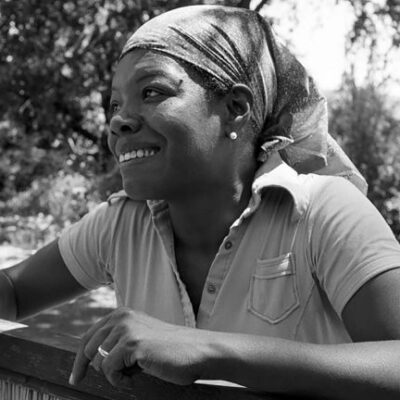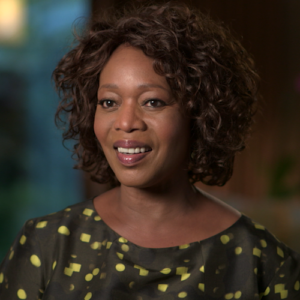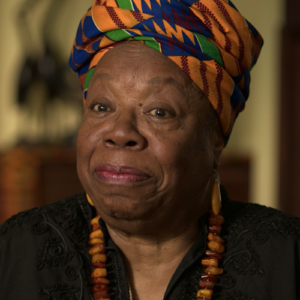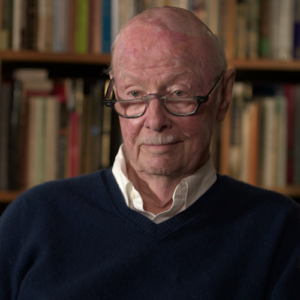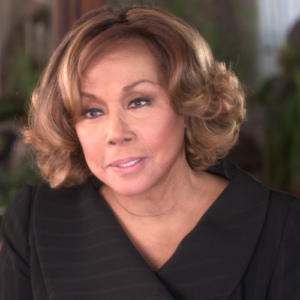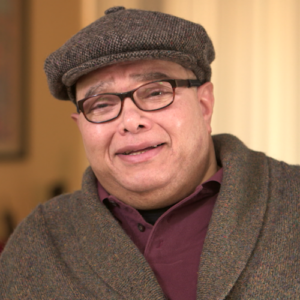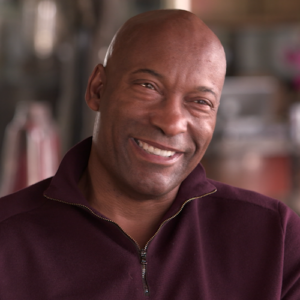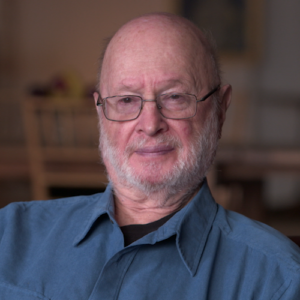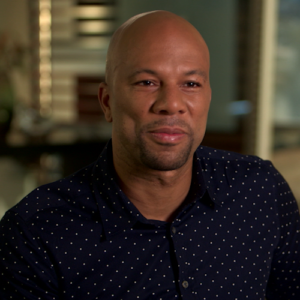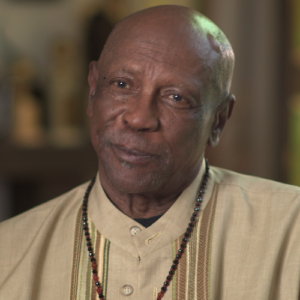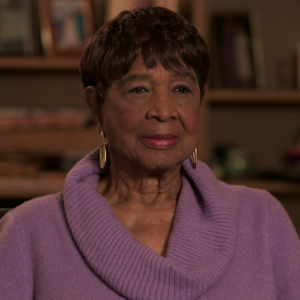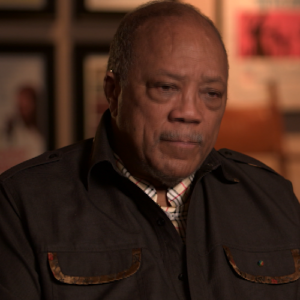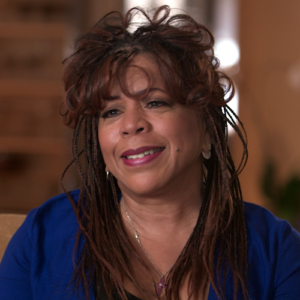Interviewer: You’re a dancer. My Angelo’s a dancer. I don’t know if that’s the way you met or not, but would you let me know who you are and how you met Maya Angelou?
Don Martin: How I met Maya is, we had a dance troupe in Los Angeles called The Last Two Horton Dancers. And we worked commercially, and we heard that we were to be on a bill with Maya Angelou. And she was appearing at this little club in Beverly Hills, the little club. So we went to see her just to this is the lady we were going to open up for. She was unbelievable. You know, she just I had never seen anything like this before. This this statuesque beauty, you know, and very animated. And so we just sort of, you know, watched her and see and then it came time for us to work together. We were sitting we were rehearsing at the at the Club Seville, and it was like just spacing, you know, no particular important thing. So in the background I see this sort of silhouette watching us. And so I walk over and I says, Can I help you? And it was Maya. And she started standing up and I just my eyes followed her just up, up, up, up, up. And she says, Well, I’m to have an orchestra rehearsal today. I says, Well, orchestra. But we had orchestra yesterday is, oh, this is not conducive of good showmanship. You know, we were working I the the year was 1956, and we performed at the Club Seville with Maya and had a great run. I mean, the the best that the club did very well. I mean, she packed them in and from there we went to Las Vegas, which was a whole nother epic, you know. I mean, literally, we were on the other side of the tracks. I mean, we could not go to the strip. We couldn’t I mean, it was just that restricted, you know, And this was an experience.
Interviewer: When you say that Maya wasn’t in Las Vegas, Yes.
Don Martin: We were working with Maya.
Interviewer: Las Vegas. And when you say how restricted it was, this was about race. Yeah. Yeah. Paint the picture for me and take me to Las Vegas. Was it different than Los Angeles, 1950 or whatever?
Don Martin: The the Lester Horton dancers? We were rehearsing and we see this figure sitting watching us, you know? So I walk over and I said, Can I help you? And she sort of standing up and she just kept moving up, up, up. And she said that she was here for orchestra rehearsal. So I says, Well, we had rehearsal yesterday with the orchestra. And then she said, Well, this is not conducive of good showmanship. So we just that was an icebreaker for us, you know. So the next night was, of course, opening night. And Maya wowed them. I mean, like I say, I’ve never seen a woman, you know, hold an audience like that, you know, And we had a two week gig. And then after that, we went to Las Vegas, and now this was like 56, 57. I mean, the country was in political oppressed civil rights. So when we get to Las Vegas, we realize that. It’s we’re confronting this idea that we can’t go here. We can’t go there. I mean, we were a diverse company, the last two Horton dancers. We were as mixed as whatever, you know. But still, because of that, we couldn’t do this. We couldn’t do that. We couldn’t cohere. Yeah, well, working with my at that time, we were we were like a young company. I mean, young in the sense of naivete, just inexperience. So we kind of looked to my ear to for guidance, and we followed her. We followed her lead. So like being in Las Vegas and confronting that, I think we just kind of let her lead the way. I mean, she didn’t react or outburst or, you know, make any kind of defiant thing. She just, you know, mellowed and. Thank you very much. So we had, like I said, we were living on the other side of the tracks and there was this little greasy spoon where we had we could eat this little restaurant, you know.
Interviewer: So let me just say this to bring this home to me and that you’re in Las Vegas. Some people are living one way, but because your troop is mixed in my black and leading the way, you guys are on the other side of the track and break down what that means.
Don Martin: Well, we were our company was diverse, but we were a group that diversity didn’t mean anything. It didn’t matter to us, you know. I mean, we were told that, okay, if you break the company down to being all white or black, we can hire you in Vegas. We didn’t go with that. You take us as we are or you don’t take us at all. So we stayed like we were, and consequently we were booked downtown as opposed to being booked on the strip, you know, I mean, because at that time, Lena Horne, Belafonte, Sammy Davis, they were all, you know, big name black performers, but they were working on the strip, but they were subject to the same thing. They couldn’t mingle in the lounges. They had to perform, go back to their room. They were, you know. You know, confined to certain places, you know. So it was pretty general and and there was nothing we could do about it at that time. You know.
Interviewer: And follow my lead on how to deal with.
Don Martin: Exactly. She kind of she she protected us in a sense that, okay, no, we’re not going to do this. We’re not going to act that way. Let’s just do our job and get the hell out of town, you know? And that’s what we did. We we performed. And well, to this day, Las Vegas is. I mean, I have nothing. They can give it back to the Indians, as far as I’m concerned, you know. But I mean, that’s my feelings for plus Vegas. But we parted companies, you know, after we got back to Los Angeles. And my I went to New York, you know, and just we we did something funny. I have to go back and tell you this said before she went to New York, we got this old fur coat and we tore it apart and made this enormous fur stole for her to be very kind of. Yeah. And it was quite funny. I don’t know what the fur was, but it was not, you know, It was a fur. Yeah. So we made this elongated fur piece and she wrapped herself in it and went on to New York, and that was our goodbye. And then, you know, she became this lady of the letters. I mean, mine was blooming. She was always growing, you know, and getting stronger or getting, you know, I mean, that flower was just blooming in her, you know, and, and even today it’s still blooming, you know. I mean, whenever I see her or talk with her it’s, I know it’s there, you know, and like I say, when we parted company and, and after the Vegas thing she just. Went on to do what she had to do, and she’s still doing it, you know.
Interviewer: So she part she goes to New York, she’s still home and. Now, your friendship has lasted a long time because I’m trying to remember. Did you know any of Maya’s husbands? Did you know the first one was Angelo’s that you only met before? You only met Paul.
Don Martin: Paul? Yeah.
Interviewer: Okay. Tell us a little bit about Maya and Paul differ.
Don Martin: Well, Maya returned to Los Angeles with Paul, and they were very much in love. And actually, M.J. and I went to stand up for them when they got married in Santa monica. You know, and we cracked the bottle of champagne and toasted them, and I had to go back to work, you know. So, yeah, Paul was Paul was Maya’s husband, and she loved him dearly. They were a good pair. They were? Yeah, they were. They were solid, you know. I mean, they had their differences artistically or whatever, I don’t know. But they communicated with one another, you know, in a good way.
Interviewer: And you say that with the glint in your eye?
Don Martin: Well, because I was I was subject to them being together. And I could see Maya sitting across the table looking at Paul with with a look that was just you can’t describe it any other way. But wow, this woman is really taken with this guy, you know? And it was genuine. He she I mean, that was the thing about my relationship with my a we kind of knew one another on that level. We didn’t I mean, we didn’t talk about her personal things. I mean, it was just it was like a vibe I got. And we we connected that way. We always did. I think that happened when we first met. We kind of bonded that way. You know, It’s just it’s like, yeah, I’ve met my sister, you know, and and we’ve maintained that kind of relationship all these years. You know, it’s we were that close without saying we were close. We just we were, you know, we are not one.
Interviewer: She sat across from Paul and you saw her look at Paul. I’m sure you saw Paul. Look back at.
Don Martin: Her.
Interviewer: At him. Was he was he funny? Was he what?
Don Martin: Paul called himself a a block neck Irishman and he drank a lot his, his drink and he was robust and and he was a writer as well. That I think that was their kind of linkage with each other. They understood one another through writing to, you know, they, they cultivated a bond that way, you know, And because Maya was she at that point in time in her life, she was, you know, climbing up the ladder of success. I mean, she was writing she was being acknowledged as a writer, you know. And so Paul was very supportive of her, you know, And and at that time, after they married, they went up to Sonoma to live and.
Interviewer: Did you ever visit him there? Yes. Yeah, There. So they had vineyards? Mm. Everybody doesn’t know that. So I want you to just kind of describe the house, the grounds, because there was it was an interracial marriage in the seventies and eighties, and I think he was an architect.
Don Martin: He it was the house was one of those do overs. And Paul undertook that job. I mean, he really physically hammered and nailed the house together again. I mean, the time I went up to see them, he was under the house repairing things, you know, and and Maya was paying this homemaker, you know, she was in the kitchen, whereas which is her kind of sanctum, really. She loves the kitchen, you know, That’s her. Sounding place, you know, because she can cook, which she loved to do, and and sort of like be herself, you know. And it was it was good for a while there. I didn’t know too much about your living there because I didn’t stay up there that long. I just went up to visit and came home. But she was happy and and I could see it and and that was it, you know.
Interviewer: You know, she said to us, out of all my marriages, that was the one I felt like I could dance on. The head of a pin is what she said about it. And so she was she said she was very brokenhearted when it ended.
Don Martin: Yeah. Yeah.
Interviewer: She was. You know her at that time After the marriage ended. Did you all have any?
Don Martin: Yeah, there is. Maria came to my house one night, knocked on the door and she says, Don, my marriage is over and I had to get away from Sonoma. That’s all she said. I had to get away because knowing Maya as I do, she at that time she was. She could explode. You know, now she’s learned how to contain herself. She’s you know, she’s. Refined herself in the sense that she’s she’s a lady. You know, she’s she’s unbelievably refined. But at that time, there were some raw edges. When the marriage sort of came apart between she and Paul. My had. I mean, she was a work in progress at that time. And and like I say, she she did have some raw edges, but at the same time, being sensitive enough to realize that she had to. You know, remold herself or not really, Remo Because that’s. Calculative. I think she just knew that she had to grow into this woman that, like her mother was. You know, Vivian was was that well-rounded, experienced woman. And I think that was my as would he call it, like an example. She wanted to be like her mother, which she finally she grew to be like Vivian, but went on beyond Vivian to me, you know. But Maya, like I said, she came to my house like a broken woman. She was hurt, and I received her. You know, what else could I be? Of course I would always. My door is always open to her. You know, like her door’s open to me. We. I. I’m glad I was there for her at that time.
Interviewer: Go back to. She spent the night there. And not just assuming that like a friend. You took care of her.
Don Martin: Yeah. Yeah. She knocked. Knocked on the door and came in and told me, you know, briefly what? Didn’t go into any kind of detail because, you know, it’s none of my business. And that’s a private marriage. It’s a private thing, you know? But I just knew that she needed arms around her, and I’m glad I was there to to do it for her. We sat dry and and she kind of unwind and, you know, just sort of in the process of unwinding, I guess, realizing what she’s got to do to go on. You know, there’s Maya was never one and still she’s not one to. Just sit still. She’s got to move. She’s got things to do when she.
Interviewer: So when she came in, you all spent time together after she was in Los Angeles. I don’t know if she left right away. But you also know her as a civil rights activist. What do you know about that part of her life?
Don Martin: Being at that time. You know, I guess it was like going back to Las Vegas. This country was in that kind of mode, the civil rights movement. And Maya was always a just woman. You know, she fought injustice. And that’s why I said when we followed her lead, being in Las Vegas and she didn’t protest overtly, she just, yeah, I guess made mental notes that this has got to be corrected, you know? And then when we got back and then when the country really moved into a civil rights movement, I think she joined in completely. She was called upon to be a figurehead. And I think most of this took place back east, you know, where she became really active in the civil rights movement.
Interviewer: Now staying in this area. You knew Vivian Baxter?
Don Martin: Mm hmm.
Interviewer: This is a fight because most people didn’t know Vivian Baxter. So what I want you to do is tell me a little bit about your perception of Vivian Baxter and Vivian and Maya, how you watch them relate to one another.
Don Martin: Well, my knowledge of Maya’s mother, Vivian, I didn’t know them in a sense that I. I met her, and I could tell that just through Maya’s. Viewing her mother that she admired her mother. Like I’d met the brother Bailey. I’d met I met the family, you know, And but still, my only connection was through my I didn’t intermingle or had really no kind of react thing with Vivian. We met once when I was introduced to her. My said, This is my mother, Vivian, and the personality came out. I mean, Vivian was. She was incredible, you know, And I could say, Yeah, I could see where Maya gets this from. You know.
Interviewer: I’m not Maya’s brother, Bailey. So we have.
Don Martin: Time. Yeah. Maya’s love for Bailey was really complete. I mean, she felt that the sun rose and set on him, and she would do anything possible for him. And she did. I met Bailey in his late years when he when he was very ill in Winston-Salem and he was in the hospital, and, um, and I went several times to the hospital with Maya, just to be with him, to see her. And, and I could see the closeness. I felt the closeness between the two of them. She. You know, Bailey’s life was not, you know, wasn’t a happy one, you know. But it certainly was a profound life for her, you know, because they they grew up being solid as a as a team. I mean, she and she and Bailey communicated with one another that most brothers and sisters don’t really do that. You know, and Maya made it possible for him to. I think she she did as much for him as she possibly could to give him a better life. You know, and and his children and I mean, my it took on the response.
Interviewer: I’m sorry. I’m just hearing that. Okay. Thank you for that.
Don Martin: Now, Maya took on the responsibility as being the matriarch of the family after Vivian. Passed. You know, she kind of was the. You know, the forerunner for the family, you know, and and it was out of love. Out of really out of love and devotion. More than that.
Interviewer: What was the reason for that?
Don Martin: Well, my I took on that responsibility as being the leader of the family, really, because first of all, she was able to and even more than that, because she wanted to, you know, thank God she was financially able to do it. But but that was beside the point. I think she would have done it if she didn’t have it. I mean, she had a saying that if more people come to dinner, just put more water in the soup. You know, she she always made it a point to have be inclusive. Yeah. Especially with family. You know, she never excluded people. Yeah. And that’s part of being my oldest is how I take her. You know, she’s very a very generous, generous, generous woman. She. He’s. She’s exceptional.
Interviewer: So Maya has had this friendship with you over 55 years. So I want you to tell us that and tell me she has this thing about her brother friends, I’m sure of which she refers to you as one. What do you think has connected the two of you over these 55 years?
Don Martin: Starting back. You know, 55 years ago, when I first met Maya, we we bonded. And it’s been climbing since then until today. And we did become. Brother, sister. You know, we we loved one another, we respected one another. We encouraged one another. You know, she she’s been a rock for me, you know, just. By the mere fact of knowing her, you know, being and being in her presence. I mean, through my I’ve met well, through my I met MJ as a sister.
Interviewer: So Maya has a lot of girlfriends, too. And there’s a foursome that I want you to tell me about the girls. Mm hmm. That Maya was the person that collected these deep friendships. What did that look like?
Don Martin: Well, the four ladies that I know were, of course, were Maya, Jessica, Dolly and MJ. These. These four ladies, I. I have a picture of them that I call the Four Graces, you know, And they they they’re just. They’re connected, and they’re not even touching one another. You know, but you. You feel that joining between them. And I met Jessica at Maya’s house, and this was like at the end of her life, it was in Winston-Salem. And and, of course, I met Dolly in Winston-Salem as well. So I you know, I’m meeting people that are close to Maya, you know, And then, of course, being close to her, I just sort of take it that they’re going to be close to me, you know, and and they and they were and they are you know, I feel very special because, like, my relationship with Maya is unlike. I mean, she’s been with professional people. She’s had great jobs with and done things with people. But I, I think I have an edge because we have an emotional thing together. You know, and it and it’s really. Not a solid, you know. I mean, I could call her and she said, Oh, my brother, Yeah, I have my sister. You know, there was a wonderful story. I traveled with Maya on a tour that she was doing down South, and this was the first time I’ve ever been really south, like in Mississippi. George, You know.
Interviewer: What year.
Don Martin: This was late, but. I would say, in the nineties. She was on a speaking tour and we were in the airport and these young girls ran over. Oh, there’s Maya. There’s Maya. So she mind. She says, Good morning. You know, they didn’t hear Good morning. Then she said, Oh, Maya. And she says, Don’t you meet people by saying good morning? You know. I hope. Good morning. And she says, and I’m a little bit older than you, so you don’t call me Maya. Yeah. I mean, she was she was teaching and that’s what she does very sort of quietly she lets you know. Yeah. And that’s what she did to me. I mean, it was. It was amazing. Yeah. So these little girls finally realize it. Oh, Dr. Angelo. Yeah, it’s just. Good morning. Yeah. So she’s she’s constantly teaching.
Interviewer: It’s quiet sometimes, but the teaching has to take place sometimes if it’s not as quiet. You know, if you were ever there. But she tells the story about escorting somebody out of the house and telling them to leave because of using racial pejoratives. And so sometimes, you know, it’s strong. But everybody has that story of Maya letting you know that we all should adopt a place that’s respectful of one another.
Don Martin: Mm hmm.
Interviewer: Just want to ask you. I think Bob may have a few more questions. There have been some of the pictures that you have. She was with Roscoe Lee Brown. You were there for the 70th birthday party, which was a cruise that Oprah gave.
Don Martin: Yes.
Interviewer: Talk a little bit about that and set the context for it. You were invited to.
Don Martin: Well, that was that was an amazing eight years. Yeah, the 80th birthday.
Interviewer: I think it was the 70th of the 75th.
Don Martin: No, I’m sorry. It was his 75th birthday. And Oprah gave Mya this eight day cruise and. I was invited. We went. We got to Florida. We boarded this in an incredible liner. And it was only for Oprah and her party. You know, it was like I dare say it was probably like 250 people on this cruise. And and, you know, of course, the only stipulation that Maya had with the with the whole thing was that on this cruise, on the menu, you know, she can’t eat fish. She can’t be around fish. Yeah, well, my birthday series with Oprah started, I think, the 65th, and it became a like a five year event thing. So the first one, the 65th, was at work, Wake Forest University. And Clinton was supposed to be there. So we got these invitations, plus we had to get a clearance through the FBI, you know, And so we went through all of that. And I mean, the party was amazing at that. The university I mean, Oprah spared no expense for Maya. I mean, I think her relationship with Maya is like she sees Maya as a mother figure. Maya sees Oprah as a daughter figure. And I think that’s their, you know, relationship. And so. She gives Maya these incredible birthday parties, you know, And then the 70, the 65th is 70th was. What was it? I think it was. Wake Forest as well. Then the 75th, which was the big one, that was the cruise. Where should we get an eight day cruise? Through the Caribbean. And we were this far from Cuba. And I mean, it was amazing. I mean, again, Miss Winfrey just spared no expense for Maya, you know, And again, because she loves Maya, you know, and and everything was just top notch, you know? And like I said, the one thing that happened that shouldn’t have was that the the kitchen made the mistake of doing a fish thing one night. And. Maya. You know, found out about it and she had a reaction. And but that was the only downside of it. The cruise itself. She had Nancy Wilson entertaining. I mean, every night was an event. You know, and then they had it was over Easter. They had a sunrise service on deck where women wore these big Easter bonnets. I mean, it was it was fun. Bill T Jones and his company did a performance. There was always something going on in the event, you know. And like I say, it was just unbelievable, the crews, you know, and.
Interviewer: I want to take you back to one just one couple things really quickly. When you this is going way back now, when you first saw Maya dancing, can you describe her, her style, her dancing style? What did it look like to you? What was it What did you hear?
Don Martin: My first viewing of Mya as a performer was when we worked together because I never really saw her dance. I mean, I didn’t. Mya danced, but she wasn’t a dancer, you know? She just has that talent of being a performer. So when she when I saw her working on the floor, here was this woman standing in front of a stand up like she didn’t touch the mic, you know, she moved it with her foot. Yeah. And I mean, she was captivating. I mean, she was inventive with with her movements. She was limbs. I mean, she was a beautiful giacometti’s sculpture.
Interviewer: Just give me a little into a sense of that, because she was almost calypso.
Don Martin: Yeah, well, at the time, you know, that was the the trend in music, Afro-Caribbean, calypso, and and Maya was known as Miss Calypso, and she was very kind of Afro Caribbean presentation. And like I said, you know, she, she was so strong in movement and, and, and she knew exactly what she was doing. She was like it was like watching somebody go it a brain surgeon doing surgery. She was that exact and that refined it. She knew how far to take it. She was a learning lesson when you watched her, you know, it’s like, wow, this woman knows what she’s doing. The voice was no, it was a great voice, but she knew how to use it and how to command it. And and she was she was in charge. She was. And so she left the audience wanting more.
Interviewer: You mentioned earlier in the interview that she could easily explode. What did you mean by that? Could you talk about that? What at that point earlier, you know, that earlier period before she became Maybe you could bea little more, I don’t know, maybe a little more mature in the…
Don Martin: Well, with my eyes, I think her personality is that she has very little tolerance for mediocrity. I remember seeing her on a talk show where this little young starlet, it was like, I think it was Johnny Carson’s or something. And my was like. Saying something and this little starlet was like interrupting, you know, and sitting in the next chair. My attorney says, Sweetheart. Hold that point for a minute, you know, And that’s how she put her off. You know, and she went back to saying what she was saying. So she. With with saying less, she will let you know what she means. And I mean she won’t. I don’t mean to paint the picture that she’s volatile or anything that but she’s forceful in a way that you know, when to back down.
Interviewer: Let’s go back to that. So just give me a little bit about the sense of, you know, time is important to her. She doesn’t suffer fools, you know, a little bit about what you’re saying. Try not to say, like I said, this is a standalone. Yeah.
Don Martin: Well, with my I’ve found that.
Interviewer: Let;s sart over, we heard a door slam.
Don Martin: Okay. With my. I’ve found that time is too important. We can’t waste it. And she. She doesn’t indulge, you know, that kind of mediocrity, you know. And I think that’s how she comes across with people may be intimidated by her, you know, but not it’s not by design. It’s just that she let you know that, you know, I don’t do this.
Interviewer: What have you, you know, you’ve had such a long relationship with her. What is she? How is she changed your life?
Don Martin: I think through through growth, Maya has evolved. She’s really changed anything. She’s just I think the word would be evolve. She’s he’s come to a mellowness. He’s like she’s she’s aged with her maturity and her her intelligence. You know, she she’s sensitive to things now more than ever. You know, she. I really I still marvel at the time when I first met Maya, being this this wonderful young. Stallion and then seeing her now, it’s just beautiful, beautiful, mature, you know. Woman, you know. And it was all there at the beginning, but it was just. Unseen or Einfeld. I’m sure she felt it, but nobody else did.
Interviewer: Yeah, just to pick it up. I guess what I was trying to get to was. How has she changed your life?
Don Martin: Mine has changed my life immensely, and it’s constant. It’s like I’m so grateful to her in so many ways. You know, through her life, I’ve met people and just being privileged to call her my friend, you know that. I mean, that’s I can’t get over that really, you know? And it was not by design. It just it’s just something that happened that’s happening. You know, it’s it’s constant. You know, it’s. I mean, she’s. She’s a treasure to me. Really. I just. I’m grateful to her.
Interviewer: That’s great. Well, thank you, Don.
Don Martin: Thank you.
Interviewer: What do you think her legacy is that she leaves. She’s left so many works to our culture. What is her legacy?
Don Martin: Maya’s legacy will be her genuineness, her. Her. Kindness. And her words will be lessons to all really to come. You know, I think what she’s put. In book form. Well. It should be for everybody to read almost compulsory, you know, because this woman has had a life and it’s been so constructive, you know, that out of. This. She became this. You know, and it could happen to anyone, you know. I mean, I think that’s that’s really the true American dream. You know, it’s not it’s not material. It’s not you know, it’s. It’s growth of a person, you know. And I think that that’s what Maya’s legacy is going to be. You know, that that you can become a good person. Given the opportunities or given the chance to make those opportunities happen. Because nobody. Promised her. There’s nobody. I mean, she made it happen. And that’s how really, that’s how I instruct my kids. My my class. This is. You’ve got to do it yourself. Nobody can hand it to you. You’ve got to make it happen if you want it to happen, you know? And I think that’s a lesson that certainly I’ve learned from her. It’s your responsibility.

